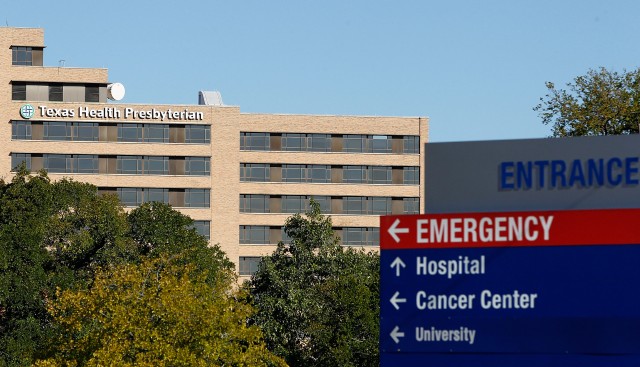Each person who contracts the virus spreads it, on average, to one or two other people. It's not as contagious as HIV, SARS or measles.
2. Ebola Is Not Airborne...
Ebola is transmitted through bodily fluids, such as blood, sweat, saliva, breast milk, feces, urine and semen. However, infectious disease specialists say Ebola is not an airborne disease, like the flu.
3. … but It Can Be Dangerous
While Ebola's not the deadliest contagious disease (defined as the mortality rate for people who are diagnosed), outbreaks can have fatality rates up to 90 percent, according to the World Health Organization. The fatality rate for the current outbreak in West Africa is estimated to be about 70 percent.
4. Health Officials Oppose A Travel Ban
A travel ban, health specialists say, would be difficult to impose and would cut off help to those countries in West Africa hit the hardest by the disease. Dr. Thomas Frieden, director of the Centers for Disease Control and Prevention, said a ban would make it harder to track the travel itineraries of infected people. On Tuesday, Department of Homeland Security Secretary Jeh Johnson said travelers arriving from Sierra Leone, Guinea and Liberia must fly into one of five U.S. airports equipped for passenger screenings (see Fact 6).
5. We Can Help Stop Ebola By Asking People How They Feel...
The CDC's Epidemic Intelligence Service tracked down possible cases of Ebola by asking people who came in contact with Thomas Eric Duncan how they felt and if they had a fever. The first symptoms of Ebola are a fever, fatigue, muscle pain, headache and sore throat, according to the World Health Organization.
6. … or Taking Their Temperature
Passengers flying from West Africa to Washington Dulles International, Atlanta's Hartsfield-Jackson, Newark Liberty International, Chicago's O'Hare and New York's John F. Kennedy International airport have their temperatures taken as part of Ebola screening. The no-touch thermometers used in airport screenings aren't perfect, but they're one step in identifying patients who may need further testing.
7. The Sick Need To Stay Home
For people who have been in contact with someone who tested positive for Ebola, a 21-day quarantine (the virus' incubation period ranges from 2 to 21 days) can help stop the spread of infection. Nearly all of the people quarantined in Dallas because they had contact with Thomas Eric Duncan have passed the 21-day mark.
8. And Their Pets Need To Be Considered
Spanish health authorities euthanized the dog of a nurse who was diagnosed with Ebola. We know the virus can live inside dogs because they produce antibodies against Ebola. But we don't know if dogs can transmit the virus to humans.
9. The U.S. Has Specialized Facilities For Patients
The Emory University Hospital has treated and successfully released three patients with Ebola, and the Nebraska Medical Center has treated and released two. These hospitals use biocontainment units to protect hospital staff and other patients. Nina Pham, a nurse who treated Thomas Eric Duncan, was flown from Dallas to the National Institutes of Health Clinical Center in Bethesda, Md.
10. There Are Experimental Drugs, But They Need More Testing
Experimental drugs for Ebola are being developed, including ZMapp, which is produced in genetically modified tobacco plants. The drug was used to treat Kent Brantly and Nancy Writebol earlier this year before the limited supply ran out. GlaxoSmithKline, Johnson & Johnson and NewLink Genetics are working on experimental Ebola vaccines.
11. If You're Healthy, You Can Still Take That Safari
The Ebola outbreak remains in West Africa, and countries other than those bordering Guinea, Liberia or Sierra Leone aren't considered to be at risk. The CDC does not recommend that travelers avoid visiting other African countries. "Ebola is a very low risk for most travelers," CDC says on its "Questions and Answers about Ebola" page.
